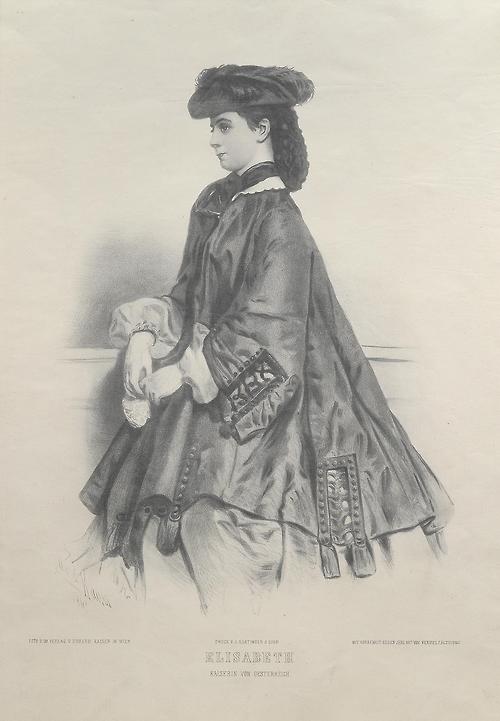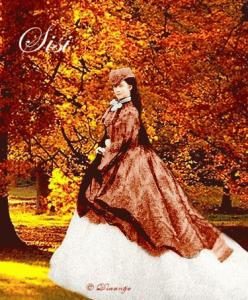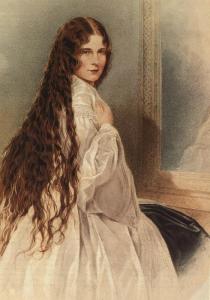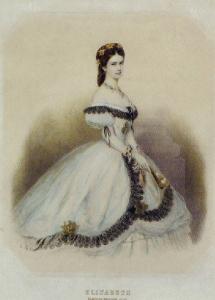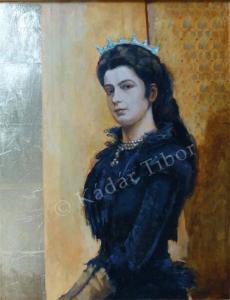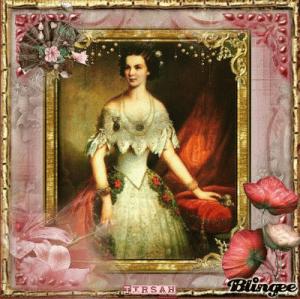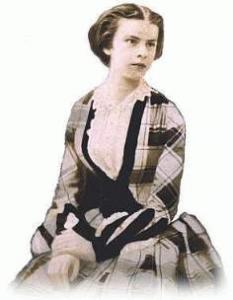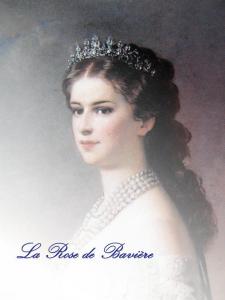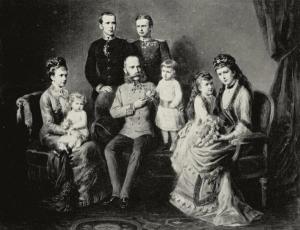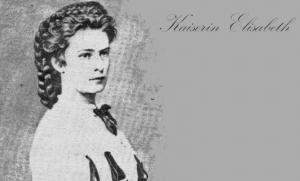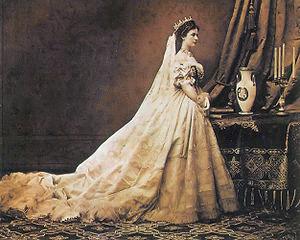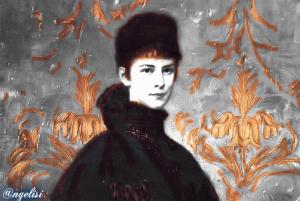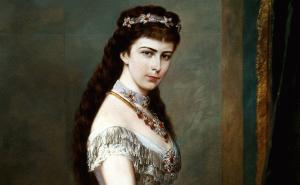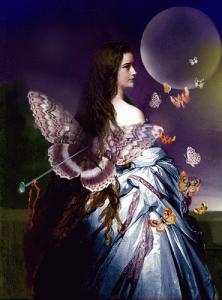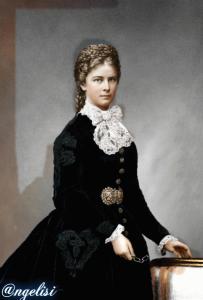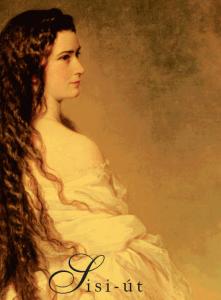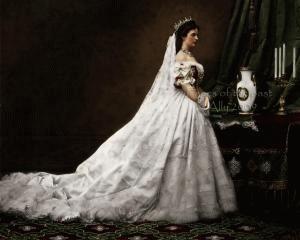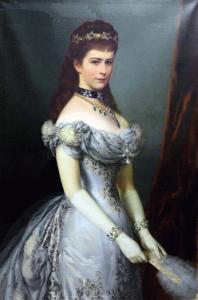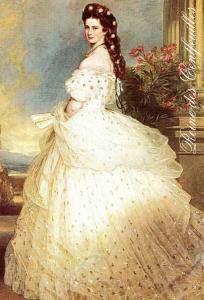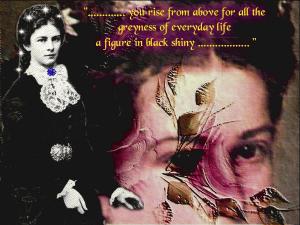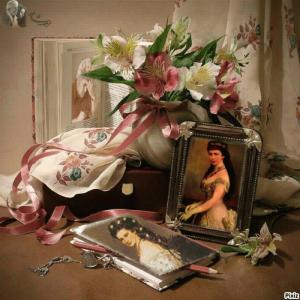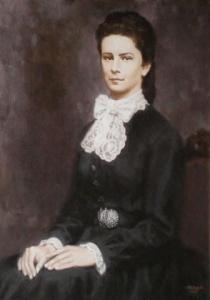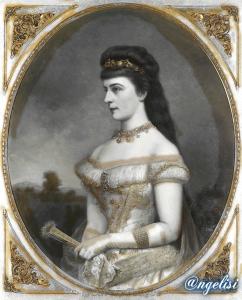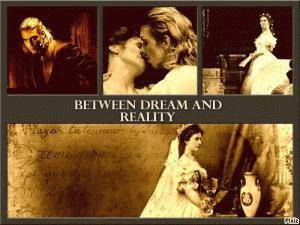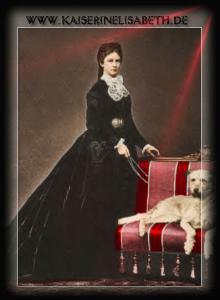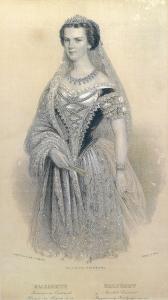some photomontage for remember the engagiement
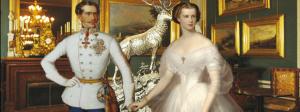
The engagement of Sisi and Franz
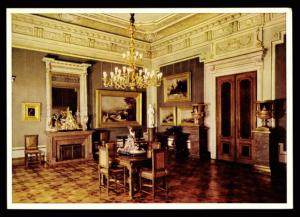
The engagement of Sisi and Franz
Sissi, Elizabeth, Aurelia, Eugenie, Duchess in Bavaria was born in Monaco December 24, 1837. Ludovica, his mother, enjoyed a higher rank. Wittlesbach daughter of the Elector Maximilian, who became king of Bavaria through an alliance with Napoleon III, was born Princess of Bavaria. The wedding, which took place in 1825 with the Duke Max, his second cousin, has precipitated from the main branch of the Wittlesbach to the cadet branch, and now it's just the Duchess in Bavaria. This union, which was not sympathy nor love, leaves her unsatisfied in his pride and his sensitivity. His life is dull, made up of habits and grudges. While she is bored waiting for her husband, they sing, travel, causes scandal, squanders the money of the family and have children by other women. Legitimate children are unjust and amoral. At present rumble of a mother too prefer a father who disappears and reappears quite often, every arrival of which is a party.
For the first warm days of summer, the family left the city and moved to the summer residence of Possenhofen, situated on the shores of Lake Starnberg.
Elizabeth has a petite body, all the nerves and muscles, which grows with a passion for physical exercises. He will never forget the first few years of his life, and perhaps, in the memory, embellish them. In this period it is neither pretty nor a scholar, yet all the love and life seems simple. She likes to get up early and riding since dawn. Does not care about style and even more dangers. Without knowing it, is already a very good rider and instinctively goes into his father's dream. He wants her fearless and wild, and she is. Try afraid only during nightmares, and yet, at the moment of awakening, somehow manages to contain his fright. Little passionate and turbulent, relishes the warmth of the nest. A Possenhofen come as soon as the echoes of the great upheavals of 1848, and the Duke Max, protected by his liberal ideas, is not threatened by the revolutionaries.
At thirteen, fourteen years old, you have to invent a love. The squire of the Duke is cute, the head of Elizabeth begins to turn. She's in love, everyone noticed. The young Count Richard is not a party suitable for you, and Duke Max does not want to be deprived of his beloved daughter, who looks like him so much. The idyll is interrupted, the young man sent to a distant place. A few months back after sick and dies almost immediately. The teenager is upset. In the life of Elizabeth's death is already an appearance and gives the story a bitter sweet taste.
The focus of the family has moved away from her to focus on her older sister. It seems you want to prepare Elena to a great destiny. It takes care of its education more than the other guys, insisting on the study of foreign languages and history. Elena often accompanies the mother who teaches her how to behave in polite society. How to Sissi, would never dream of inferior treatment to which he is not entitled. That preparation foreshadows prestigious wedding plans, while Elizabeth continues to love the deceased Richard. In Vienna there is a free heart, that of the young Emperor Franz Joseph, the first cousin of Helen.
In March 1848 riots were driven out of Vienna Metternich and the Emperor Ferdinand. The court took refuge in Innsbruck, Tyrol, and then to Olmutz, in Moravia. The empire is in danger, Hungary and Milan rebel. Attempts to proclaim the Republic of Venice and the Venetian Republic as a time to come back. Prague is in the hands of the insurgents, Austria can no longer bear Metternich. It still saves the Habsburgs and draws some merit. The emperor Ferdinand, who reigned from 1835 is an incompetent. It's a kind man, but he is sick, suffering from nervous breakdowns, stuttering, weakness. His cadet, Francis Charles, is not worth much more. It is not completely idiotic, but his shyness, his lack of character and his incompetence does not make it the ideal emperor of an era of great turmoil. Its unique quality is to have a wife Archduchess Sophie, capable woman who does not hesitate to take action, immediately understanding the benefit that can be drawn from the situation. He brought up his eldest son, Francis Joseph, as a crown prince, and the young do not lack the qualities needed to be. Thank God does not suffer from nervous diseases of the Habsburgs; the revenge of the unfortunate marriage that has endured. His brother, the Emperor Ferdinand abdicated, and at the same time her husband, Archduke Francis Charles, waiving its rights. Sofia will not be Empress, but in his place on the throne, sit Franzi, who will be doubly indebted for the crown.
August 15, 1853. Ludovica, Helen, Elizabeth and a maid traveling towards Isch and Salzburg, direct long-awaited appointment with the Archduchess Sophia and the emperor.
In the Crimean war broke out, the troops of Tsar Nicholas I have crossed the Danube and in their struggle against Turkey, hope in the support of Franz Joseph. The tsar did not have perhaps lent a hand and troops in Hungary? Thirty thousand Russian troops crushed the Hungarians that wanted to break away from Vienna proclaim the fall of the Habsburgs. Elizabeth knows nothing of the miseries of the people, poverty, and disease. His father is a liberal and yet lives as a man with a passion for luxury, extravagant expenses. She does not know that once you cross the border will enter into a new world.
Francis Joseph, an imperial punctuality, makes his entrance in the lounge. Elizabeth hardly knows this first cousin. They glimpsed years ago, she was still a child, he was already a man. Néné makes a great reverence, with a smile made rigid by the looks, the importance of the role attributed to them. Sissi observes what adults do when they try and hope of seducing each other. Just listen to the words of convenience, sees only affected attitudes. Despite this, the boyfriend of his sister is very nice. Tall, blond, slender body in the uniform with the red and white. When the eyes of Francis Joseph settle on her, Elizabeth lowered her, and when he dares to raise them, his gaze lingers emperor, following the movement of her long curls, caressing her figure, finally stopping on his face, which is covered redness. He has not had a moment's hesitation. Even before you talk to her she realized that her life would depend on which of the little girl did not imagine coming. At first glance, the impossible has occurred, he felt more alive than he had ever been, as perhaps will never be. With something like that, all the mothers of the world, all empires, all the uniforms, can do nothing. Not still awaiting a response from her. And 'shocked by his discovery: Elizabeth, fifteen and a half years, is the one who hoped to meet, the one you want. Represents the childhood that he did not know, is the shyness, while he also had to learn too soon to show off. It's wild, while he has only attended palaces, is a whole set of things that upset him. For Ludovica defeat is not total. If the eldest daughter remained on the shoulders, at the same time that would be less accasata.
The Archduchess is determined to fight, convinced that her son is making a mistake. He needs a wife educated, refined, of a woman who will help him in his task, which includes. Elena would be perfect. For the last time trying to convince him, but he does not want to listen.
Ludovica is ecstatic after the first dance at court. Where Elena has failed, Sissi is about to succeed. The Archduchess Sophie rapidly changing attitude. Will shape this little girl as soft wax.
Upon returning from his mission, Archduchess inform the child that his application engagement was welcomed.
The Archduchess has given precise orders: you have to tame that wild girl and begin to teach the rudiments of Austrian history. At fifteen, Elizabeth discovers his own curiosity. With Janos Majlàth, his teacher, a little man of seventy, smart, witty, erudite, Hungary is entering its destiny of sovereign and woman. Majlàth is not a revolutionary. In 1848, when the outbreak of the Hungarian revolution, has remained loyal to the Habsburgs, a choice that liberals the reproach of his country. Majlàth speaks with the fervor of the ancient Hungarian constitution, for which his compatriots have shed their blood and that Franz Joseph was repealed in 1849.
On March 4, the marriage contract is signed in the absence of the groom.
from the website: http://digilander.libero.it/comfox/d_sissi.htm
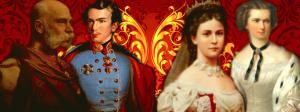
Sissi, sovereign in step with the story
Beautiful , beautiful indeed , Elisabeth of Bavaria , Sissi said , it certainly was. Although, perhaps , a little ' less than I want the legend grew up around him .
The older sister , Helen, according to what was said at the time, was the most beautiful , educated and admired, seemed destined to a future larger. No coincidence that it was precisely the latter chosen for the wedding of the century, the one with the young Emperor Franz Joseph. The fate decided otherwise . When , in 1853 , the two sisters , accompanied by his mother, went to Ischl , on the occasion of the birthday of the Emperor of Austria , there was the twist that reversed the double plots of the emperor's mother , Archduchess Sophie , and aunt, mother of Helen and Sissi Duchess Ludovica .
Franz Joseph was struck by Sissi, then sixteen , a young girl with long blond tresses dark and melancholic gaze . It was , really, love at first sight . The two first cousins , were married a year later in the church of the Augustinians in Vienna after having received papal dispensation .
Sissi began a life at court , challenging and sometimes overwhelming , full of formalism and ceremonial spagnolesco , so different from the one he had conducted , free and carefree in his native Bavaria , in direct contact with nature. He suffered and , in particular , suffered the leadership and the intrusiveness of her aunt and mother-in-law , the Archduchess Sophia , jealous guardian of the rites and traditions of the Habsburg resented his unconventionality . In the austere halls of the Hofburg , the life of the young empress was not particularly happy in spite of the passion that bound both spouses . Sissi he felt like a " seagull prisoner in the castle ."
They were the sons ( and with it new tensions with the mother-in-law ) , travel in the territories of the Empire State from the Lombardy-Venetia Hungary, then his solitary stays abroad. You had the feeling that the couple they crossed deep crisis , but it is not true. Francis Joseph was always in love with the wife and persevered in the memory even after the dagger Lucheni the anarchist Luigi took his own life in 1898 in Geneva. Even the feelings of Sissi did not change . One of his poems , entitled Dream of Franz Josef, written in the years ahead , confirms this: "Last night I dreamed that you were dead / and my heart was painfully touched. / (...) / Maybe you hold me again what your heart :/ that makes me so sad , it's just / that my heart is petrified , dead for such happiness. "
The human story of Sissi , whose life was snuffed out tragically and was punctuated by continual misfortunes , metaphorically represents the side restless and dramatic , almost telluric of the Habsburg myth that still survives. ..................
Of her it was said that it was an early feminist , democratic , and even republican , libertarian , and even protocomunista . Many of the poems that he wrote in secret and did not want to publish may , on a superficial reading , do you believe. But the reality is quite different. Sissi was aware of the difficulties she was going through the multi- national empire held up by the personality of her husband and worried about the future. He played an important political role , pushing , for example, Francis Joseph to "compromise" of 1867 that transformed the Austrian Empire into Austria -Hungary , a country with two capitals , the two parliaments , two toilets , but the most important ministries - war , foreign and finance - kept unique.
He did not want the end of the empire , so much so that when her beloved cousin Ludwig of Bavaria recognized the Kingdom of Italy, her, Sissi , wrote to him , angry and "surprise" because the act was less solidarity with the Italian dethroned princes . It was , in fact , the beautiful and unfortunate Elizabeth, a sovereign capable of grasping the lessons of history . Its existence was developed in parallel with the decline of a great empire and the race to the end of an era and of a civilization. That era and the civilization that Stefan Zweig called it , with nostalgic accents , "the world of yesterday."
Francesco Perfetti
from the website: http://www.iltempo.it/cultura-spettacoli/televisione/2013/12/30/sissi-sovrana-al-passo-con-la-storia-1.1203251
Katharina better than Sissi
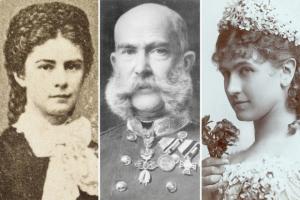
Katharina better than Sissi : latest passion of the' Emperor
An essay reconstructs the controversial relationship between Franz Joseph d 'Austria and Schratt, first actress to Vienna Katharina better than Sissi 's latest passion of the' Emperor
THE THEORIES
There is no consensus: they were really lovers? Ms. Katharina Schratt, primattrice the Burgtheater Vienna and for thirty years '' companion 'and friend of the' Emperor Francis Joseph, was or was not his mistress? Certainly not, according to historians filoasburgici; certainly yes, according to almost everyone else, as if the fact that the two have or have not had a romantic relationship should in some way modify the judgment on them. L 'only thing that could be said about it is that, eventually, would have been more elegant part of the' old sovereign, once a widower, to marry the kind and beautiful lady who, by all accounts, he was much closer and most devoted of 'Empress, was for thirty years' intermediary between him, icy and inaccessible, and the people, especially the Viennese, and held in his villa in a step by Schoenbrunn, a real court regularly getting all the big d 'Europe. But not necessarily an emperor, while elegant in 'dress and manner, also has this kind of courtesy. The new book on Schratt (but again only in Italian: in German was released for the first time in 1941, a year after his death), entitled L 'imperAttrice and written by Joachim von Kuerenberg, which, as is explained in'introduction, he met in person and Katharina that Francis Joseph, more than a biography is a collection of scenes from the life of 'actress, mosaic tiles which, put together, contribute to give a' pretty comprehensive idea of not only the character but also of ' Viennese ambience at the turn of two centuries, particularly the theater. Being the 'author, albeit with some ideas quite critical of the' emperor, though a devotee of the Austrian royal family, does not even put into question the 'absolute chastity of' friendship between Katharina and her sovereign glosses, indeed (rightly ) on 'argument. The "pictures" that make the book more interesting are probably the ones that relate to the first part of the life of Schratt, when he was only an admired actress of extraordinary popular success and not yet the favorite of the king: the glorious and eventful season of those Viennese theatrical years - that the 'author, in fact, seems to know by heart - it is in fact read a lot unless the tragic events that accompanied the decline of the Austro-Hungarian monarchy. The daughter of a charterer of coaches of a Viennese suburb, Katharina was almost forced to run away from home to do the 'actress, a project that Dad Schratt flaunted finding it hard entirely inappropriate for a young lady for good. The girl carried the day thanks to a series of lucky breaks that led her to perform in very close times, in front of the directors of the two major Viennese theaters, always in competition, which were held the young artist, aggiudicandosela, to the sound of contracts increasingly important, now the 'one hour' s more, so that in a short time she became the most loved, most watched, most pampered prima donnas of the many Viennese of 'era. Not extraordinarily gifted, perhaps, to hear the critics, but unsurpassed in parts of pretend naive, owl matricolata, cheerful girl of the people who outwits the riders refined and sophisticated ladies of the salons. And it was precisely in these clothes from the stage that won the 'Empress Elizabeth: habitual frequenter of the theater, which immediately and persistently, having claims his friendship, not without insight, located in the lively and witty actress the right person to put next to 'imperial and no longer young husband during his frequent absences already. Who had intentions to stretch further.
Isabella Bossi Fedrigotti
The book: "The 'imperAttrice» Joachim von Kuerenberg, publisher Mgs Press, 286 pages, € 14.46, tel. 040.44968 Isabella Bossi Fedrigotti Page 37(13 May 2003) - Corriere della Sera from the website:
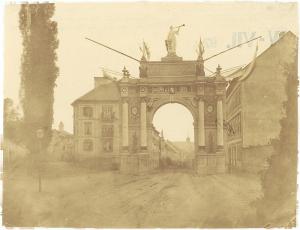 Triumph arch in Graz on the occasion of the visit of Kaiser Franz Josef and Kaiserin Elisabeth in 1861
Triumph arch in Graz on the occasion of the visit of Kaiser Franz Josef and Kaiserin Elisabeth in 1861

Franz Joseph and Elisabeth - and they lived happily ever after?
Franz Joseph and Elisabeth - as a dream couple of the Austrian monarchy, they have gone down more in the popular literature in history. The emperor falls in love with a beautiful young princess and takes her back to his castle - the stuff of fairy tales are written. But their marriage was like really happy?
Young, attractive, ruler of an empire and Single! Franz Joseph was a popular game in the marriage market of the European aristocracy. Franz Joseph politically extremely ambitious mother Sophie had already concrete plans. She arranged on the occasion of the 23 Her son a birthday celebration in Bad Ischl, to which her sister Ludovica was loaded with their 19 year old daughter Helene - hoping that the Emperor would find pleasure in his cousin Helene.
But things turned out differently: Franz Joseph - at this point does the story of the famous Sissi trilogy with the events match - falls head over heels in love Helene's still very childish sister, the only 15 year old Elizabeth, who actually only Supporting Actress' at should be this trip. "Oh, if he would but a tailor!" Elizabeth is said to have exclaimed. However, "there is not a Kaiser basket!" Even in Bad Ischl, the engagement of the future king and queen were announced.
1854, half a year later, took place in Vienna, dream wedding 'instead: A marriage began, which represented a most unfortunate arrangement for both sides. Elisabeth reluctant life in ▸ court. She suffered from the strict protocol, the intrigues and its obligations. The young Empress nevertheless tried in the early years, to meet the expectations. They also fulfilled the important duty of an Empress, when she brought the Crown Prince Rudolf to the world. Increasingly, however, Elizabeth came into conflict with the conventions and rules of the Vienna ▸ court, personified by her mother in law.
Franz Joseph was between the wishes of his wife and the demands of his mother torn. Elizabeth withdrew more and returned to the farm and her husband increasingly back on. Of a married life could be no more talk from the 1860s. Franz Joseph and Elisabeth remained amicable connected to wrote letters and met regularly. "You do not know how much I loved this woman", Franz Joseph said to have exclaimed after Elizabeth's murder. In place of his absent wife always - well supported by Elisabeth - the "dear, good friend," Francis Joseph, Castle actress Katharina Schratt the most important emotional support of the aging emperor.
Sonja Schmöckel
From site http://www.habsburger.net/de/kapitel/franz-joseph-und-elisabeth-und-sie-lebten-gluecklich-bis-ans-ende-ihrer-tage
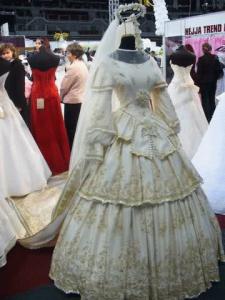
Anyone know anything about Sisi's wedding dress?
31.03.2007 Publisher: netzeitung.de
Magnificent flowers in silver are all that remains. The rest of the bridal gown of Empress Elisabeth of Austria has disappeared.
The precious, elaborate silver embroidery wedding dress from the Austrian Empress Sisi is decorated with a cassock today. It is now on display in the Sisi Museum at Hofburg in Vienna.
Where are the other parts of the dress robes are advised about there big guessing even with the reported connoisseurs of the Habsburgs in Vienna. Now you want to discover the secret of "Sisi" wedding dress on the track in a large search operation.
Information by e-mail
The official archives mention - about the origin as well as to the whereabouts of the embroidered dress after the wedding day. Therefore, the art historian Katrin Under Reiner, curator of the Sisi Museum in Vienna is based on recollections of private collectors, Sisi fans of court servants and descendants: sketches, traditions about production or use, indications of possible manufacturers - any hint is welcome. They can be sent as an e-mail to: [email protected].
A well-kept secret was the dress as far back to the Empress: The marriage of the 15-year-old Bavarian Princess Elisabeth Amalie Eugenie of Austria Franz Joseph on 20 April 1854, which in hindsight was transfigured on the fairy tale wedding was not intended for everyone's eyes. Only the families and the court were the bride in her jewelry to face - even Rapporteur had to rely on their imagination. "There are a few contemporary pictures, but on each image Elisabeth wearing a different dress," says the curator of the Vienna Sisi Museum Katrin Under Reiner.
The artist could be simply inspired by the prevailing fashion, and followed their own intuition. "However, it is difficult to imagine that Elizabeth came with plunging neckline at the altar, as shown. This is certainly not authentic, "says art historian. And the mystery continues. The search is further complicated that is not even known where the dress was made. "There was a tradition that the bride's family for their wedding dress made, therefore it could in Bavaria, have been perhaps even manufactured in Munich."
Enigmatic origin
As enigmatic as the origin of the dress is also what happened to it after the ceremony. Only a single document provides a hint: The Art of inventory pilgrimage church of Maria Taferl in Lower Austria in 1857 recorded an ivory coat Vespers, which was decorated with silver embroidery of Sisi's wedding dress. "Probably the whole dress was donated to the church," says Reiner lower.
Nothing unusual: Clothing of nobles and accompanying the imperial family was often given to favored pilgrimage churches. It was also not uncommon that the equipment was broken. Thus, the bridal jewelry of Elizabeth and the veil in the treasury of the Bavarian pilgrimage Altötting are seen.
The churches transformed into marvelous pieces often liturgical vestments. Maria Taferl in the artful, about 30 centimeters wide silver embroidery with elaborate floral pattern of the dress was removed and applied to a Vesper coat of white silk moiré. This was until the 1950s even in use, knows the custodian of the treasury of Maria Taferl, Christian Schüller.
At the time, as with the well-known films of the romantic "Sisi cult" began, the value of the peak was estimated and given different coat of Vespers in the treasury. Where the actual dress is then left to think about giving the archives of the Habsburgs and the church as little information as to the origin. While the protocols at the court, and the records of the Empress record itself other details of chocolate consumption on food and hard consequences meticulous processes, there is a gap just with this romantic event. (Maier Irmgard Schmid, AP)
From site: http://www.netzeitung.de/vermischtes/600851.html?Wer_weiss_etwas_ueber_Sisis_Brautkleid
Between Sisi and Franz Josef who was the real victim .................
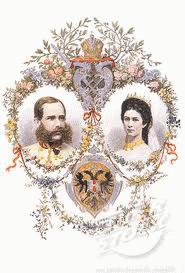
Between Sisi and Franzz Josef who was the real victim .................
"Behind every great man c?'s Always a great woman." It is a place too common to be true. It is not true, for example, in the case of Sissi and Cecco Beppe or Franz Joseph d? Habsburg emperor of? Austria-Hungary, and Elisabetta Amalia Eugenia von Wittelsbach, who became his wife and then empress.Francis Joseph was not the greatest ruler in history, even if brought the crown - in effect - longer than anyone, from 1848 to 1916, or for nearly seventy years, unable to keep up and in full working order an empire vast and complex, consisting of com? was from many nationalities. He was born in 1830, in theory had no right to the throne, but the? Ambition of his mother Sofia, as well as the poor state of health (physical and mental) of the other Habsburgs, managed to get him the throne at the end of a year so stormy as to become proverbial, "a forty-eight." Yet, to enchant the imagination (and popular film) is its fragile wife Sissi, on which were shot almost thirty films: her character, her husband as a prince-consort, a figure of the second floor.Of course, the? Boot was romance and romantic, but also in that the protagonist was the one that the Italians called Cecco Beppe. In 1853, at age 23, went to meet his bride, who was the elder sister of Sissi, Elena. Having regard to the sister, had no doubts between the two. Helen, trained from birth to become queen, was stiff and formal as a clerk of court ceremonial, Sissi, who was 16 years old, happy and carefree, beautiful, seemed "fresh as a freshly peeled almond."Having said that, Sissi agreed to marry him, saying, "I love the? Emperor, but if it were not l? Emperor." In this sentence, all? Humble appearance, c? Was already ruined marriage. He, in fact, the emperor was, and how. He would wake up at 5 am and went to sleep (on a military cot) at 21, after having worked hard all day. As a child he had been taught that in order to learn to drive, you would first learn to obey, and called himself the "first employed in the service of the kingdom."She had been brought up in a life without thinking too rigid and formalities. The rigor of the Habsburg court soon became a boulder, from gift he received from his mother-in-law in the first birthday of Empress: a rosary. Soon began to detest the Habsburg dynasty, and to suffer for their excessive wealth, compared to the poverty of the common people. More of that? Soul and of? Empire, however, Sissi was concerned about her beauty, and no expense spared. She was beautiful, of course it was beautiful, but a beauty that today would appear immediately suspected: five-foot-72, weighed 50 pounds. Anorexic. A? Anorexic masking their disease with the excuse of living and healthy eating: a lot of sport and little food. To dress up the needed three hours, since her clothes were sewn on to bring out the thinness, particularly the legendary wasp waist. The hair, if loose, came to her ankles, and needed another three hours for? Hairstyle. Fortunately, according to the custom of the time, were washed frequently, every three weeks, with a? Operation that required throughout the day and during which the? Empress could not be disturbed for any reason. It was hot baths of oil? Oil, to keep the slimness of her hips, at night they bandaged with wet cloths and slept after having applied beauty masks made of strawberries or raw veal.Nevertheless, the couple managed to have four children, three girls and one boy, l? Heir, Rodolfo. An heir unfortunate prey of women, alcohol and morphine, who committed suicide with? Lover in 1889, at age 31. A blow to the parents, who also led a life that already more than the distance of proximity. She was devoted to long journeys that lasted six months, in hot places far from Vienna, as Madeira and Corfu.He, however faithful, given the strict religious upbringing, he had bad luck and trouble and did not finish. The Italian possessions of the Lombardo-Veneto were in constant agitation, supported by those pesky ambitious Savoy and Piedmont, and Napoleon III. At the end, they lost. More trouble came from? Impatience Hungary, where he always wanted more autonomy. Even the staunchest allies Prussians constituted a permanent threat to their expansionist militarism. Franz Joseph moved from absolutist centralism to federalism, centralism again and again to federalism, as needed, and even granted universal suffrage. His patriarchal figure and intangible morally, however, obtained the respect of his subjects.He was thus able to keep the feet? Empire until? Last, never giving way to despair. Despite the death of his brother Maximilian, in 1867, shot by the rebels after he became emperor of Mexico. Despite the assassination of Sissi, in 1898, stabbed by an anarchist on the lake of Geneva, died of? Internal bleeding: the clothes were so tight that the blood could not escape. Despite the death of the new heir, his nephew, Franz Ferdinand, at that? Assassinated in Sarajevo that led to the First World War.Franz Joseph could say that "Nothing I was spared on this earth," but what - perhaps - would have been the greatest pain he was spared. He died in 1916, aged 86, when the war seemed victorious, and did not witness the breakup of his empire. On 20 November, the doctor forced him to go to bed at seven in the evening, and? Emperor gave orders to wake him up at half past three, because he had to "finish a job." He died in his sleep, at least he.
www.giordanobrunoguerri.it
From site : http://www.ilgiornale.it/news/basta-santificare-sissi-l-eroe-cecco-beppe.html
Photo from : http://www.franz-josef.cz/en/

Franz Joseph .............which husband.
The Emperor FrancisJoseph was a very congenial spouse (Elisabeth). The son of a domineeringmother, he was accustomed to submit aidesideri women. All his behavior showsthat he was tenderly devoted to Elisabeth. Though she has been, since thebeginning of the union, very jealous of all the female characters that theEmperor had the opportunity to attend, the testimonies are unanimous indescribing Francis Joseph as a husband substantially true and fair chain, sonot really as an enterprising womanizer. It 's even possible, because of itssoftness, was despised by Sisi. In comparison, the Hungarian count Andrassymust esserele appeared as a man full of virility and temperament. For Francis Joseph,the charm of Elizabeth was in her own way of being self-centered, reluctant andeven unpredictable. Like most of the women patner such, the Emperor was deeplyattached to his family and very thoughtful: a behavior full of impatience andindulgence that also has something mother ............. .... If Sisi can withcertainty say that it was from early childhood was particularly close to hisfather, Francis Joseph is found instead in a strong inclinanazione to themother. As the spouse"maternal" he attached little value to his "conjugalrights" Consider the sexual aspect of married life-Will writes indesigning such a figure of husband-only of secondary importance .............................. Appears modest andreserved, and prefer not to give impressions of superiority.................... The frameworkoutlined by Will, emerges very clearly from the letters submitted andsentimental that the Emperor wrote to his wife. It is natural to wonder whatled a man of his status and its importance to take an attitude so humble andservile.Ma on closer inspection it is noted that he had any uoni reasons tobehave in this way. And 'well known that Francis Joseph, especially in theearly days of their marriage, did not avoid the seduction of beautiful donnedid not hesitate to embark on sexual adventures. In our opinion, in the case ofthe Emperor, we are confronted with a psychological phenomenon well known, thatdlla cleavage of amorous feelings: the beloved womanis not sexually desired and sexually desired woman is not loved. From the"Empress Elisabeth" by Gabriele Praschl-Bichler editions: Longanesiand &
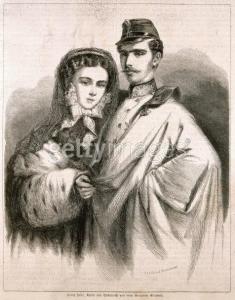
"Story of Imperial engagement "
On 16 August 1853 the Bavarian relatives were Ischl. Asthe luggage had not yet arrived, they had to make the first visit in travelingclothes, visit Sofia waited with trepidation: Ludovica, caring mother, Nene, alittle awkward and embarrassed, and Sisi, relaxed, because he was a characterin the background . Franz Joseph clung to his cup of tea, his mother try tokeep awake the conversation and bring it on 'topic that was pressing. Had takencare to place in front of the villa's band Reggiemento Cuirassiers of Wels, andwhose overwhelming performances helped to dispel the atmosphere ofembarrassment.But the things turned out differently from what she had planned. The next morning,Francis Josef went into his mother's room and expressed his enthusiasm, but notfor Nene, but for Sisi. At lunch recently spoke with Nene, who sat beside herand almost ate his eyes Sisi, who was sitting opposite. At the ball, Neneappeared with a laurel wreath, but it was brilliant Sisi's arrow had hit in thehair, not intentionally, the heart of the sovereign. Franz Joseph danced thecotillion dance with her, and so the whole court learned about his choice hadfallen.On 18 August, at lunch, birthday, Sisi was already seatedbeside the Emperor; Nene at the other end of the table.................................................................................................The next evening, on the summit of Siriuskogel, brightletters and E FG surrounded d ell garland wedding, engagement announce theEmperor Franz Joseph I of Austria and the Duchess Elizabeth of Bavaria.The 23th monarch fell in love like a lieutenane, like manyyoung men of his age, of a beautiful girl. It was something that had neverhappened before: an Emperor Chesi married for love and not for reasons ofstate, who was his mistress but a flame of amorenon wife ........................And Sisi? was requested only "pro forma" andwhat else could answer if only she was happy to marry such a handsome youngman, moreover Emperor of Austria. The days of Ischl furonoun dream vanished tooquickly she could not explain it ........... " From "Francis Josef (splendor and decline of theHapsburg Empire in the life of his last great representative)" by FranzHerre
THE YOUNG KAISER AND KAISERIN AND THEIR ENGAGEMENT
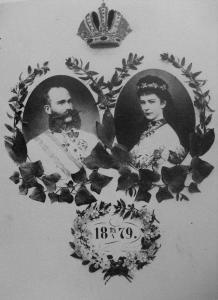
Franz and Sisi, the prototype imperial couple
Whenever ‘the Habsburgs’ are mentioned in public, the image that impresses itself on most people’s minds is that of the happily married imperial couple Franz Joseph and Elisabeth. The picture of a smartly uniformed Franz Joseph replete with his characteristic sideburns is just as popular as that of Empress Sisi – the ‘Sissi’ of the much-loved film series. The principal works of popular literature on the history of the Habsburgs also concentrate on ‘Franzl’ and ‘Sisi’ and are unsparing in their use of flowery expressions and superlatives. Franz Joseph is presented as an uncreative, deeply religious oddball who has no interest in art whatsoever but is an exemplary bureaucrat – in his later years he becomes the very epitome of the Monarchy and is the sole force holding the Empire together as its nears its end. He ‘is entirely committed to the office of emperor’ and has a ‘fanatical sense of duty and order’. In spite of the little time available to him, he is a ‘family man’. He enjoys playing with the children but at the same time sets store by their being brought up to become ‘worthy’ members of the family. In addition he is ‘close to the people’ and – last but not least – he has affairs, which are considered understandable and his right as a powerful man, especially given that his ‘angel Sisi’ – whom in spite of all their marital problems he ‘idolizes’, overwhelming her in his letters with protestations of love – neglects her ‘marital duties’. Elisabeth, on the other hand, is portrayed as creative but psychologically unstable. Although she does attain political significance here and there, as in connection with the Compromise with Hungary, she is for the most part presented as the ‘free-thinking Empress’ who spends most of her life travelling. She takes little care of her family, withdraws into her ‘self-created dream world’, is a ‘crazed Romantic’ and acts in a manner ever more divorced from reality. When Franz Joseph and Elisabeth are presented in this way, no consideration at all is given to the question as to what they were actually like as people. Naturally, in their respective dynastic milieus they were brought up in accordance with the dominant ideas of the time concerning what was the right behaviour for a man, a woman, a future monarch, a marriageable young noblewoman. However, when historical persons such as the dream couple ‘Franzl’ and ‘Sis(s)i’ are overdrawn to the point of being unrecognizable, the question as to the core of truth in the historical evidence has been left entirely by the wayside. In such cases, the ‘old Emperor’ and the ‘beautiful Empress’ are no longer real people but psychological projections, used to justify and consolidate rigidly established images of the roles proper to the sexes and ideas about the way a ruler and ‘his’ spouse should act and look. Furthermore, they also serve to encourage readers to look at the declining ‘empire of many peoples’ and its declining dynasty through rose-coloured spectacles and to distract their attention from the darker sides of Habsburg history. From site : http://english.habsburger.net/module-en/franzl-und-sisi-die-prototypen-von-kaiser-und-frau-kaiser




